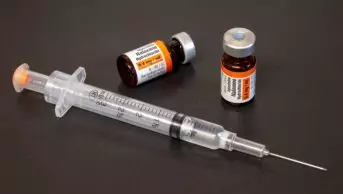
Shutterstock.com
All opioid medicines will need to carry prominent warnings about the risk of addiction, health and social care secretary, Matt Hancock, has announced.
The decision follows initial recommendations from the UK’s Commission on Human Medicines (CHM) opioid expert working group, which is undertaking a comprehensive independent scientific review of all available evidence on the use of opioid medicines in the UK.
The CHM has advised that the label warning should appear prominently on the front of the medicine pack and should state “can cause addiction” and “contains opioid”.
The Medicines and Healthcare products Regulatory Agency (MHRA) said it would be seeking voluntary compliance from industry and, if necessary, the changes will be mandated.
It said it was anticipated that packs including the warnings on product labelling will begin to begin to be seen by patients by the end of 2019.
“This is an important first step to help minimise the risks of addiction associated with opioid medicines, while supporting patients to get the right information at the right time to support their care,” said June Raine, director of the MHRA’s vigilance and risk management of medicines division.
Roger Knaggs, associate professor in clinical pharmacy practice at the University of Nottingham and specialist pharmacist in pain management, said that, in principle, it seemed sensible to draw attention to the addictive potential of all opioid medicines.
“This proposal is in line with additional warnings on [over-the-counter] codeine- and dihydrocodeine-containing medicines that have been required for several years,” he added.
But he said it was essential for prescribers and pharmacists to discuss both the benefits and harms associated with opioid medicines on a regular basis.
“Whilst opioids are effective for acute pain after trauma or surgery and at the end of life, they should only be continued in the longer term when they provide sufficient pain relief to allow a person to be more active.”
Andrew Green, GP committee clinical and prescribing lead at the British Medical Association (BMA), said: “Clearer labelling around what medicines contain, and explicit warnings about the risks of addiction are a step in the right direction.
“Over recent years, the BMA has put forward a number of tangible recommendations that would reduce the harm caused by prescription drug dependence, including the creation of a dedicated national helpline and an increase in the provision of specialist support services for those who find themselves in the grip of dependence.
“We continue to push for these solutions as part of the ongoing Public Health England review and hope they will be taken forward when it reports later in the year.”


